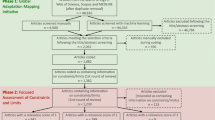Abstract
Institutions in many wealthy industrialised countries are robust and their societies appear to be relatively well insulated against the impacts of climate variability, economic problems elsewhere and so on. However, many countries are not in this position, and there is a growing group of humanity which is not benefiting from the apparent global adaptive trends. Worst case scenarios reinforce the impact of this uneven distribution of adaptive capacity, both between and within countries. Nevertheless, at the broad global scale human societies are strongly adaptive and not threatened by climate change for many decades. At the local level the picture is quite different and the survival of some populations at their present locations is in doubt. In the absence of abatement, the longer term outlook is highly uncertain. Adaptation research needs to begin with an understanding of social and economic vulnerability. It requires a different approach to the traditional IPCC impacts assessment, as human behaviour, institutional capacity and culture are more important than biophysical impacts. This is consistent with the intellectual history of the IPCC which has gradually embraced an increasing range of disciplines.
Similar content being viewed by others
References
Adger, W.N.: 1996, ‘A theory of social vulnerability in coastal Vietnam’, Presented at Designing Sustainability: Fourth Biennial Conference for Ecological Economics, Boston University, 4–7 August.
Alexandratos, N. (ed): 1988, World agriculture: toward 2000, (FAO), Belhaven Press, London.
Blaikie, P., Cannon, T., Davis, I. and Wisner, B.: 1994, At risk: Natural Hazards, People's Vulnerability, and Disasters, Routledge, London.
Bohle, H.G., Downing, T.E. and Watts, M.J.: 1994, ‘Climate change an social vulnerability: towards a sociology and geography of food uncertainty’, Global Environmental Change 4(1), 37–48.
Brown, C. and Longworth, J.: 1995, ‘Agriculture’, in J. Henningham, (ed), Institutions in Australian society, Oxford University Press, Melbourne, 131–152.
Cornia, G.A., Jolly, R. and Stewart, F. (eds): 1987, Adjustment with a human face. Vol 1: Protecting the vulnerable and promoting growth, Clarendon Press, Oxford.
Darwin, R., Tsigas, M., Lewandrowski, J. and Raneses, A.: 1995, World agriculture and climate change: economic adaptations, US Department of Agriculture, Washington DC, AER report 703.
Davidson, B.R.: 1981, European farming in Australia, Elsevier, Amsterdam.
Dovers, S.R.: 1992, ‘The history of natural resource use in rural Australia: practicalities and ideologies’, in G. Lawrence, Vanclay, F. and Furze, B. (eds), Agriculture, environment and society: contemporary issues for Australia, Macmillan, Melbourne, 1–18
Dovers, S.R.: (ed). 1994. Sustainable energy systems: Australian pathways to energy reform. Cambridge University Press, Melbourne.
Dovers, S.R.: 1997a, ‘Sustainability: demands on policy’, Journal of Public Policy 16, 303–18.
Dovers, S.R.: 1997b, ‘ESD and NCP: parity or primacy?’ in M. Cater (ed), Public interest in national competition policy, University of NSW Centre for Public Sector Research, Sydney, 75–92.
Dovers, S.R., and Gullett, W.: 1998, ‘Policy choice for sustainability: marketisation, law and institutions’, for Environmental justice and market mechanisms: key challenges for environmental law and policy Auckland, March.
Downing, T.E. (ed): 1996, Climate change and world food security, Springer, Heidelberg.
FAO (Food and Agriculture Organisation): 1996, Technical Background Documents, World Food Summit, Rome 13–17 November 1996, from http://www.fao.org/wfs/final/e/list-e.htm
Fischer, G., Frohberg, K., Parry, M.L. and Rosenzweig, C.: 1996, ‘Impacts of potential climate change on global and regional food production and vulnerability’, in T.E. Downing (ed), Climate change and world food security, Springer, Heidelberg, 115–160.
Gilbert, C.: 1992, Le pouvoir en situation extreme: catastrophes and politique, L'Harmattan, Paris.
Handmer, J., and Dovers, S.: 1996, ‘A typology of resilience: rethinking institutions for sustainability’, Industrial and Environmental Crisis Quarterly. 9(4): 482–511.
Handmer, J.W., Keys, K. and Elliot, J.: (in press) ‘Achieving change in a multi-organisational task: flood warnings in Australia’ Applied Geography.
Henningham, J.: 1995, ‘Introduction’, in J. Henningham (ed), Institutions in Australian society, Oxford University Press, Melbourne, 1–12.
Kreps, G.: 1992, ‘Foundations and principles of emergency planning and management’, in D.J. Parker and Handmer, J. (eds) Hazard management and emergency planning, James and James, London, 159–174.
Land and Water Resources Research and Development Corporation.: 1998, “Data sheets on natural resource issues. ” Occasional paper 11/98. LWRRDC, Canberra.
Leidenfrost, N.B.: 1992, International Conference on Nutrition, Plan of Action, Rome, Italy, December 11, 1992, from www.brown.edu/Departments/World_Hunger_Program/ hungerweb/ intro/food_security.html, compiled by: Nancy B. Leidenfrost, National Program Leader, Extension Service, USDA.
Martin, P. and Woodhill, J.: 1995, ‘Landcare in the balance: government roles and policy issues in sustaining rural environments’, Australian Journal of Environmental Management 2, 173–83.
Maxwell, S.: 1994, Food security: a post-modern perspective. Institute of Development Studies, University of Sussex, IDS Working Paper Number 9.
Noble, I, Gifford, R and Farquar, G.: 1997, ‘A perspective from the biological sciences’, in Proceedings, National Academies Forum: The challenge for Australia on global climate change, Academy of the Social Sciences, Australia, 15–22.
Quarantelli, E. (ed): 1998, What is a disaster? Routledge, London.
Ravetz, J.: 1986, ‘Useable knowledge, useable ignorance: incomplete science with policy implications’, in W.C. Clark and Munn, R.E. (eds), Sustainable development of the biosphere, Cambridge University Press, Cambridge, 415–432.
Reilly, J., Hohmann, N. and Kane, S.: 1996, ‘Climate change and agricultural trade: who benefits, who losses?’ in T.E. Downing (ed), Climate change and world food security, Springer, Heidelberg, 161–182.
SEAC (State of the Environment Advisory Council): 1996, Australia: state of the environment 1996, CSIRO, Melbourne.
SEICA (Sustainable Energy Industries Council of Australia): 1998, ‘SEICA condemns Australia's Kyoto “win” as hollow victory’, SEICA Newsletter, Summer 97–98, 1–2.
Smithson, M.: 1991, ‘Managing in an age of ignorance’, in J. Handmer, et al. (eds) New perspectives on uncertainty and risk, Australian National University and Australian Counter Disaster College, Canberra, 39–65.
Author information
Authors and Affiliations
Rights and permissions
About this article
Cite this article
Handmer, J., Dovers, S. & Downing, T. Societal Vulnerability to Climate Change and Variability. Mitigation and Adaptation Strategies for Global Change 4, 267–281 (1999). https://doi.org/10.1023/A:1009611621048
Issue Date:
DOI: https://doi.org/10.1023/A:1009611621048




